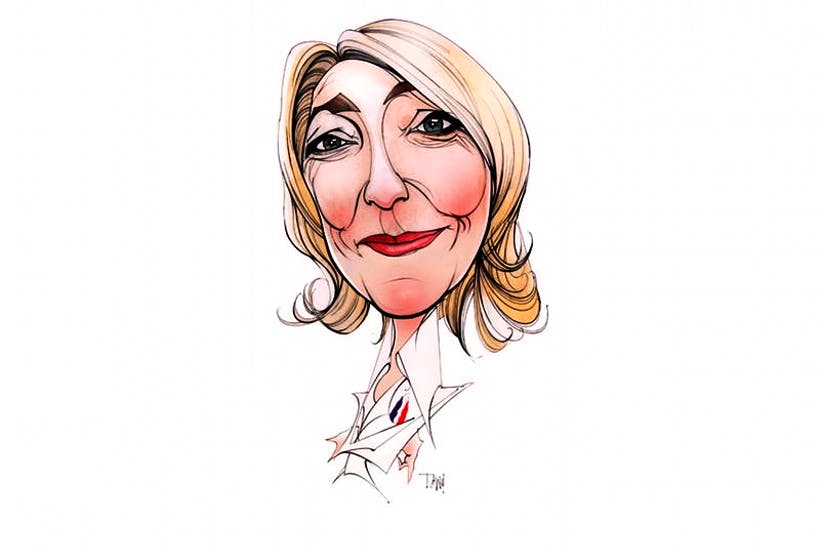Two years ago, Marine Le Pen was a laughing stock, not just in France but around the world. She was never likely to beat Emmanuel Macron in the presidential election but her barrack room performance in the live televised debate with her rival shredded her reputation. While Macron embarked on his campaign to conquer the world that summer, Le Pen disappeared from public life, reportedly plunged into a fit of depression by her humiliating defeat.
Although she emerged again in the autumn of 2017 it was without her two most trusted lieutenants, Florian Philippot and Marion Maréchal. The latter resigned from political life to launch her own college, while Philippot fell out with Le Pen over strategy and formed his own party, The Patriots, which has sunk with a speed that should serve as a warning for Britain’s Change UK.
Both the departures have served Le Pen and her party well. Maréchal and Philippot despised one another; she was a economic liberal and a social conservative, he was a social liberal obsessed with leaving the European Union. Their hostility wearied and weakened Le Pen during the presidential campaign of 2017.
But their warring did ultimately serve a useful purpose. As Le Pen slowly recovered from the debate debacle she devised a new strategy that was a form of compromise between Maréchal’s vision and Philippot’s. Gone, for example, is Philippot’s dream of ‘Frexit’ (Le Pen says that it’s better to remain and reform) and she is also distancing herself from her niece’s associations with American conservatives such as Steve Bannon.
The result is a surge in support for her National Rally party, taking her to an unprecedented level of popularity a week before the European elections. A poll in today’s Le Figaro revealed that 36 percent of the population have a favorable opinion of Le Pen, an increase of 24 percent to when she replaced her father as leader of the then National Front in 2011.
But it’s from where she’s picked up supporters that will send tremors through the French political class. Only a few years ago, Le Pen was reviled by the left. But now increasingly she is seen as the only politician who speaks for them.
Among the France Insoumise voters of Jean-Luc Mélenchon, France’s answer to Jeremy Corbyn, 58 percent believe that the National Rally should be considered mainstream and not extremist, and 36 percent of them have ‘a good opinion of the National Rally’, compared to five percent of left-wing voters canvassed in 2015. She is also polling well among women.
Le Pen deserves credit for her tenacity, for overcoming a global humiliation that would have finished most political careers. But it is mainly the mistakes of her opponents rather than her own skills that account for her revival.
Again, there are warnings for Britain’s major parties in the fate of the center-right Les Républicains and the center-left Socialist Party. For years the two were indistinguishable, their politicians in thrall to progressive policies and contemptuous of people who dared show dissent. They got their comeuppance in the 2017 election but neither party appears to have understood why they were obliterated. They are now in danger of becoming an irrelevance in French politics.
A poll earlier in the week forecast that the National Rally will come first in the European elections with 23.5 percent of the vote, one percent more than Macron’s En Marche!. Meanwhile, Les Républicains are third on 14 percent, with La France Insoumise on seven per cent and the Socialist Party polling just 5.5 percent.
The simplistic view is that Macron occupies the center ground with Le Pen on the far-right and Mélenchon on the far-left. But Le Pen has always been left-wing economically. That is why she has benefited most from the Yellow Vest protest, aided by the adroit manner in which she has approached the six-month street movement.
While the government tried initially to smear the protestors as far-right extremists, Jean-Luc Mélenchon attempted to paint them as left-wing and talked of a ‘citizen’s revolution’. Le Pen, on the other hand, recognized the Yellow Vest movement for what it was: an apolitical uprising by predominantly working-class men and women, people proud of their country, but enraged with an out-of-touch Parisian political elite. The anger has been building for decades, but Macron’s haughty demeanor was the spark that lit the fuse.
But so what if Le Pen’s National Rally wins the most votes in next week’s elections? That happened in 2014 and it had little effect on their influence, either domestically or in Europe.
Yet the political landscape has altered dramatically in the five years since and Le Pen believes that the rise of parties such as the AfD in Germany, the Danish People’s Party and Matteo Salvini’s Lega in Italy is the harbinger of a profound shift not just in European politics but at home, too. She envisions a ‘supergroup’ in the European Parliament, one that will ‘impose a much-needed reform upon the EU’.
Above all, Le Pen dreams of taking revenge on the man who caused her so much embarrassment two years ago. ‘A vote for the National Rally is the possibility of bringing down the government,’ she said at a rally on Thursday. ‘And of stopping Emmanuel Macron, the Europe of Macron, the politics of Macron, the methods of Macron.’
It’s all about ousting Macron for Le Pen, as it is for many of her compatriots, whether they be from the left or the right.
This article was originally published on The Spectator’s UK website.

























